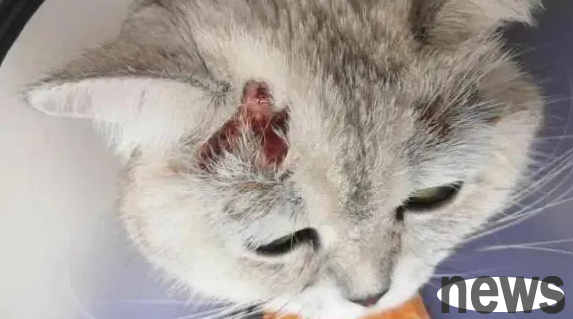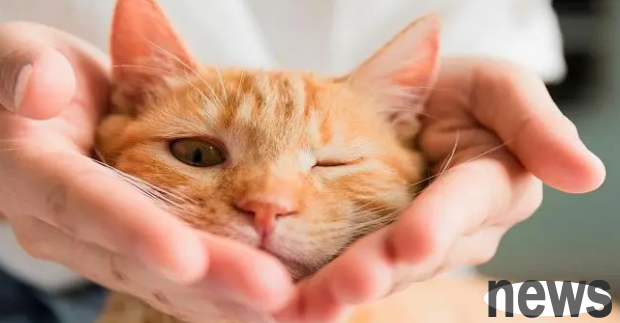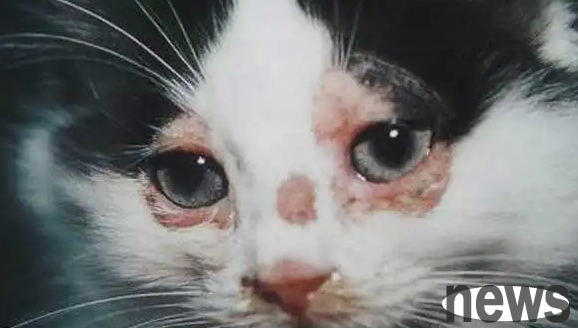"The cat scratched itself and I realized the seriousness of the problem!" A netizen shared: She found that her cat suddenly started to lick her hair frequently one day. At first, she thought it was the cat who loved to clean it, but she di...
"The cat scratched itself and I realized the seriousness of the problem!" A netizen shared: She found that her cat suddenly started to lick her hair frequently one day. At first, she thought it was the cat who loved to clean it, but she didn't expect that the cat licked her hair bald, and her skin began to turn red and showed signs of festering.
So I hurriedly took the cat to the hospital. After the examination, I found that it was an environmental allergy. Before taking the cat home, I needed to do a big cleaning at home and then dispose of all the flowers I raised. After a while, the cat suffered thousands of dollars in examinations and treatments!
Is itching, vomiting, and soft stool good for cats? Keep scratching, what should I do if my cat is allergic? What are the common causes of allergies in cats? Many problems in cats are caused by allergies. Be sure to observe them~ Let’s take a look~

1. Understand the abnormal reactions of cats and dogs’ immune systems to certain specific substances. Allergic reactions occur very casually, and almost any food, medicine, blood products, certain ingredients in the environment, and even dander and hair from other animals may cause allergic reactions.
When cats are exposed to these allergens, their immune systems overreact, releasing large amounts of histamine and other chemicals, causing a range of symptoms.
The consequences of allergic reactions can be big or small, and they vary from cat to cat, so it is difficult to grasp. This requires that cat parents be able to identify allergic reactions and the degree of allergic reactions. In addition, appropriate response measures should be given based on the allergic reactions and determine whether they need to be sent to the hospital immediately.
2. Common symptoms of cat allergic reactions
1. Skin symptoms: itching, redness, swelling, hair loss, increased dander, etc. Severe allergic reactions may also lead to skin infections or ulcers. In addition, symmetric ulcers on both sides of the upper lip are also caused by allergies.
2. Respiratory tract symptoms: sneezing, runny nose, coughing, wheezing, etc.
3. Eye symptoms: redness, swelling, tears, itching, etc. In severe cases, conjunctivitis or keratitis may also occur.
4. Gastrointestinal symptoms: vomiting, diarrhea, loss of appetite, etc. may cause cats to be malnutrition or dehydration.
5. Behavioral Change: Cats may feel discomfort or pain due to allergic reactions, which will show behavioral changes such as anxiety, irritability, and anxiety.
Minor allergic reactions usually affect the skin, resulting in redness, urticaria, skin itching, angioedema, etc. A slightly more serious allergic reaction can cause gastrointestinal reactions, such as vomiting, defecation, and diarrhea.
Those that are particularly severe will cause liver shock and internal organs to be congested. For cats, the lungs and intestines are the organs that are most likely to affect allergic reactions, and thus affect all other organs and systems in the body.
3. Common causes of allergies in cats
Common allergies are divided into environmental allergies and food allergies. The allergens we are most exposed to in daily life are these:
1. Environmental allergies: mites, insects, flowers, plants and trees;
2. Food allergies: beef, chicken, fish;
Once a hairy child becomes allergic, the first thing is itchy, and then itchy is itchy! Their body surface generally also has symptoms such as erythema, papules, redness and swelling, and otitis exterinary. If you have food allergies, you will most likely have digestive symptoms such as chronic vomiting and diarrhea.
Warm reminder: Pet allergies are not limited to the body outside the butt, their anus can also be allergic to them! Because some digested allergens will be excreted in the feces and stick to the anus. These substances can cause inflammation around the anus, which will cause a strong need for scratching or friction in cats.
So if the shovelers suddenly see the cat owner rubbing the anus for no reason in the future, in addition to considering the problems of "papa sticking to the butt", "squeezing the anal glands", and "deworming", they should also consider the allergen problem.
4. Poisonous to cats Flowers
Lily: It is highly poisonous in any part, even pollen is poisonous! After intake for more than 18 hours, the mortality rate is as high as 100%, and the cat's "Crane Head Red" is the "Catar Head Red". Don't buy it! Don't buy it! Don't buy it!
contains marialine, and the rhizomes are the most poisonous: daffodils, colchics, red vermilion, Clivia, onion lotus (leek orchid, common in community greening), tuberose, longevity flower, Manjushri orchid
contains cardiac glycoside, and the flowers and leaves are the most poisonous: oleander (also desert roses), digitalis (often found in finished bouquets), lily of the valley, butterfly (iron chopsticks, delphinium, etc.), and evergreen (a very common green plant at home).
contains other toxic substances: yew/purple shirt (strong toxicity, causing tremor, difficulty breathing, sudden death), cycad (very toxic, one or two seeds can kill), azalea (attacking the digestive system, heart, nerves), cyclamen (more will be more in the north), poppies (the fruit is the most poisonous), ivy (the leaves are more poisonous), acacia beans (sea red beans), colchicine (in addition to heart-strengthening glycoside, also contains colchicine).
If the cat accidentally comes into contact with a highly toxic plant, please seek medical treatment immediately. Again, don’t buy lilies with cats. If a cat accidentally eats a poisonous but not dead plant, you can pay attention to it and wait until the cat excreted out. If the situation is not good, then send it to the hospital.

V. Cat food allergy
Cat food allergy is a common allergy condition, and the main symptoms include skin symptoms and gastrointestinal symptoms. Food allergies usually manifest as itchy skin, hair loss, redness and rashes, and may even lead to chronic ear diseases and swelling on the face or the tips of the body.
Gastrointestinal symptoms may include acute or chronic vomiting, acute or chronic diarrhea or chronic stools, flatulence and farting. Common causes of food allergies in cats include meat, cereals, lactose products and additives. Usually, what causes cats to be allergic is the protein in food.
① Meat: beef, pork, chicken, etc. may allergies.
②Ceres: Cats cannot digest starch, and many grains in cat food are prone to allergies..
③ Lactose products: Most cats are lactose intolerant, and milk and yogurt are prone to cause diarrhea.
④Addants: Chemical components such as artificial pigments, preservatives and food attractants may be harmful to cats and cause allergies.
For cats, itching is the most common symptom of food allergies, especially on the head and face. But sometimes, food allergies may only manifest as gastrointestinal symptoms, such as vomiting, soft stools, diarrhea, etc. Skin symptoms caused by allergies can cause the cat to scratch until it loses hair and trauma occurs.
6. Observation and treatment of allergies in cats, which are often not observed by cat mothers, such as fever, red and swollen skin. If you find it, you can take a photo and send it to the doctor and pay close attention to it. Once other serious symptoms appear, you can send it to the doctor immediately.

Doctors will take measures to deal with cats' allergic reactions as much as possible, such as stopping the use of suspicious drugs, taking good care of them, and slowing down hypotension.
Picture from: Internet
If a cat has an allergic reaction, it is necessary to avoid any food that may be sensitized. In addition, if a cat wants to undergo surgery due to disease reasons, it is necessary to check whether there is any drug allergic condition in advance. The allergic reaction that occurs during the operation may be fatal. When the blood pressure suddenly drops during the operation and the cause cannot be found, allergic reactions need to be considered.
7. Prevent cat allergies
The key to preventing allergic reactions is to prevent any known substances that cats are allergic to them. Observe the cats carefully and keep the medicines at home, especially pesticides. Pay attention to identifying which green plants may cause allergic reactions to cats.
Generally, allergic reactions have good prognosis, but if the cat and the cat do not pay attention, it may recur. In short, as long as you avoid allergens, you can still be a healthy and happy kitten~